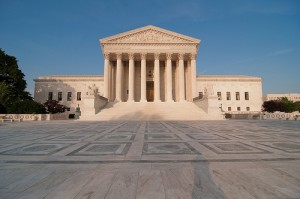Posted
12 Dec 2013 in Case Notes
In a
unanimous decision released Tuesday, the U.S. Supreme Court held that federal abstention under
Younger v. Harris, 401 U.S. 37 (1971) applies in only three “exceptional circumstances.” The Court previously identified those exceptional circumstances in
New Orleans Public Service, Inc. v. Council of City of New Orleans, 491 U.S. 350 (NOPSI) (1989). This week, it confirmed, in
Sprint Communications, Inc. v. Jacobs et al., that
Younger abstention extends no further.

The Court reaffirmed that
Younger abstention is appropriate, and federal courts should defer to state courts, only when faced with:
- “state criminal prosecutions,”
- “civil enforcement proceedings,” or
- “civil proceedings involving certain orders that are uniquely in furtherance of the state courts’ ability to perform their judicial functions.”
If none of those exceptional circumstances is present, the federal courts may not invoke
Younger abstention.
As we discussed previously,
Sprint involved two separate actions that Sprint Communications, Inc. initiated against members of the Iowa Utilities Board (IUB), one pending in Iowa state court and the other in the U.S. District Court for the Southern District of Iowa. In both actions,
 T-Mobile refused. It claimed that Section 332(c)(7) of the Communications Act, 47 U.S.C. § 332(c)(7), preempts this City requirement.
Is T-Mobile correct?
Not according to the Ninth Circuit, which decided Omnipoint Communications, Inc. v. City of Huntington Beach, No. 10-56877 (9th Cir. Dec. 11, 2013) last week. The court ruled that because Section 332(c)(7) "applies only to local zoning and land use decisions and does not address a municipality's property rights as a landowner," it does not preempt this local requirement, which concerns only how the City may lease its property.
Enacted in 1990, Measure C states:
T-Mobile refused. It claimed that Section 332(c)(7) of the Communications Act, 47 U.S.C. § 332(c)(7), preempts this City requirement.
Is T-Mobile correct?
Not according to the Ninth Circuit, which decided Omnipoint Communications, Inc. v. City of Huntington Beach, No. 10-56877 (9th Cir. Dec. 11, 2013) last week. The court ruled that because Section 332(c)(7) "applies only to local zoning and land use decisions and does not address a municipality's property rights as a landowner," it does not preempt this local requirement, which concerns only how the City may lease its property.
Enacted in 1990, Measure C states:







